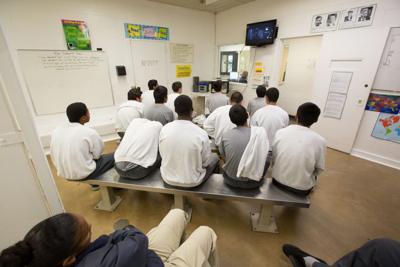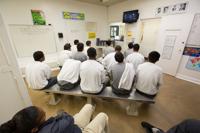
This story was originally published by EdSource. Sign up for their daily newsletter.
Top Takeaways
- The state attorney general requested that the detention facilities be placed under receivership.
- Education concerns might soon be discussed during court hearings.
- Advocates say youth voices are critical to the receivership decision-making process.
For four consecutive days last month, a group of Los Angeles County students was suspended after a fight broke out in their classroom inside a juvenile detention facility.
This is according to Stacy Nuñez, an education attorney representing one of the students, who said her client was among those suspended and questions why he was penalized before the facility called a meeting to discuss other behavioral interventions.
The Los Angeles County Office of Education can interrupt education services, even those legally required under an Individualized Education Program, if there is “an immediate threat to the safety of youth or others,” according to a 2021 settlement with then-Attorney General Xavier Becerra. A second settlement with Los Angeles County, including its Probation Department, Department of Mental Health, and Department of Health Services, was also entered at the time.
But exactly how an “immediate threat” is defined is unclear and appears to be “completely discretionary,” Nuñez said.
This lack of clarity on the legal settlement with the county education department, often referred to as LACOE, is just one of the reasons advocates say education access for detained youth must be prioritized in ongoing court hearings to decide whether L.A. County’s juvenile halls should be placed into a receivership.
Saying it is “the only option left to ensure the safety and wellbeing of the youth currently in its care,” California Attorney General Rob Bonta filed a request in July to grant full operational control of the county’s juvenile detention facilities to an appointed receiver. He also said the county is “substantially compliant with just 25% of all requirements” in the 2021 settlements.
After several court hearings on the receivership request, L.A. County Superior Court Judge Peter A. Hernandez has listed education as one of five core reform areas, along with staffing, room confinement, use of force and data management. The next hearing is on Friday.
The county’s education department declined an interview to discuss the status of the settlement stipulations.
“Over the past four years, we’ve made substantial progress across multiple areas of the agreement, even while managing significant operational changes, including the closure of Central Juvenile Hall and the opening of Los Padrinos,” Elizabeth Graswich, LACOE’s executive director of public affairs and communication, wrote in a statement to EdSource. “As with many complex, multi-year agreements, some areas required additional time to fully implement.”
Prioritizing education
Full operational control under receivership would include management of its Probation Department, which contracts with the county education department for services to students enrolled in schools within detention facilities. The most recent enrollment data shows 532 students enrolled across seven juvenile detention facilities, with at least 225 in juvenile halls.
It’s this memorandum of understanding between the departments, plus how closely they must work on a regular basis to ensure students receive an education, that makes changes to one department nearly inextricable from the other.
Despite this, advocates say education is not always a priority in discussions about reforms to the juvenile justice system.
“It’s kind of a theme that education is a secondary thought … but I think the point is really valid that young people spend a majority of their waking hours in school each day when they’re in a facility, so we should really be focusing on that,” said Megan Stanton-Trehan, a senior attorney with Disability Rights California.
When Stanton-Trehan represented detained students during the initial years of the settlement with LACOE, staff would sometimes say her clients refused special education services, only to later learn her clients weren’t always clear on what the services were.
The settlement requires that the county “document efforts to send youth to the classroom on the same day that the youth refuses to go to school, except when there is an immediate threat to the safety of the youth or others.”
But Nuñez agreed that, to this day, it still isn’t always clear whether students actually refused services or how the alleged refusal is documented.
“If I go visit a client and they don’t come out to see me, all I’ll be told is ‘they refused,’” said Nuñez, who was recently told a client didn’t want to meet with her. It was only when she pressed further that she was told the client was in the middle of completing a test.
This isn’t an isolated incident, Nuñez added, saying that when she asked her clients why they refused certain services, a few said they were in class when the service was offered and that they didn’t want to miss the lesson.
“It’s just another layer of distrust that we feel when we work with our clients, and we see this happen over and over again,” said Stanton-Trehan, who noted several issues raised in the LACOE settlement are not unique to L.A. County. “So that’s why it’s part of the agreement that they should be addressing this, but I don’t think it’s been done appropriately here.”
Advocates argue that such discrepancies make it critical for the court to hear directly from youth and their families before deciding on the receivership.
“This court process and this receivership process feels so removed from understanding or even contemplating the suffering of the young people inside right now, that it just feels completely inhuman,” said Leah Zeidler-Ordaz, community lawyering manager with Urban Peace Institute, where she provides legal representation to youth in the juvenile justice system.
She and other advocates say some concerns raised in the receivership request can be addressed by Youth Justice Reimagined, a plan for transforming the juvenile justice system that the county Board of Supervisors approved in 2020 but has yet to fully implement. The plan would move the county away from punitive approaches like detention and toward rehabilitation via counseling, family and vocational programming, and more.
Advocates worry a receivership might be the ‘same tool called a different thing’
Failure to fully implement the Youth Justice Reimagined plan — which was approved by the same Board of Supervisors that appoints LACOE’s school board members and superintendent — has left advocates wondering whether a receivership would solve the problem.
Concerns are based on a decades-long history of lawsuits and investigations into many of the same issues, which are again being raised in the receivership hearings.
“For a lot of us, some of these tools feel like just the same tool called a different thing,” said Josh Green, senior director of justice transformation and strategic partnerships at Urban Peace Institute, a nonprofit that advocates for safety and justice in communities.
Los Padrinos Juvenile Hall paints a picture of the backlog of issues. It remains open nearly two years after the state’s corrections oversight board deemed it “unsuitable for the confinement of minors” and a year after it ordered the center to shut down due to ongoing noncompliance with the state’s minimum standards for juvenile facilities.
The facility was previously shuttered in 2019 amid allegations of abuse, with six officers charged with assault and child abuse the year of its closure. It was reopened in 2023 to accommodate youths transferred from two other facilities, Barry J. Nidorf Juvenile Hall and Central Juvenile Hall, after those were deemed unsuitable for the confinement of minors.
Advocates say the receivership could lead to substantive change, including for education access, but its success would require significant changes to the way the juvenile justice system has operated for decades.
“Is the county ready for this to be a transformational moment instead of just business as usual?” Green said. “Because you can have a receiver who gets to basic compliance with the settlement and see no meaningful change for young people or for staff.”











(0) comments
Welcome to the discussion.
Log In
Keep it Clean. Please avoid obscene, vulgar, lewd, racist or sexually-oriented language.
PLEASE TURN OFF YOUR CAPS LOCK.
Don't Threaten. Threats of harming another person will not be tolerated.
Be Truthful. Don't knowingly lie about anyone or anything.
Be Nice. No racism, sexism or any sort of -ism that is degrading to another person.
Be Proactive. Use the 'Report' link on each comment to let us know of abusive posts.
Share with Us. We'd love to hear eyewitness accounts, the history behind an article.